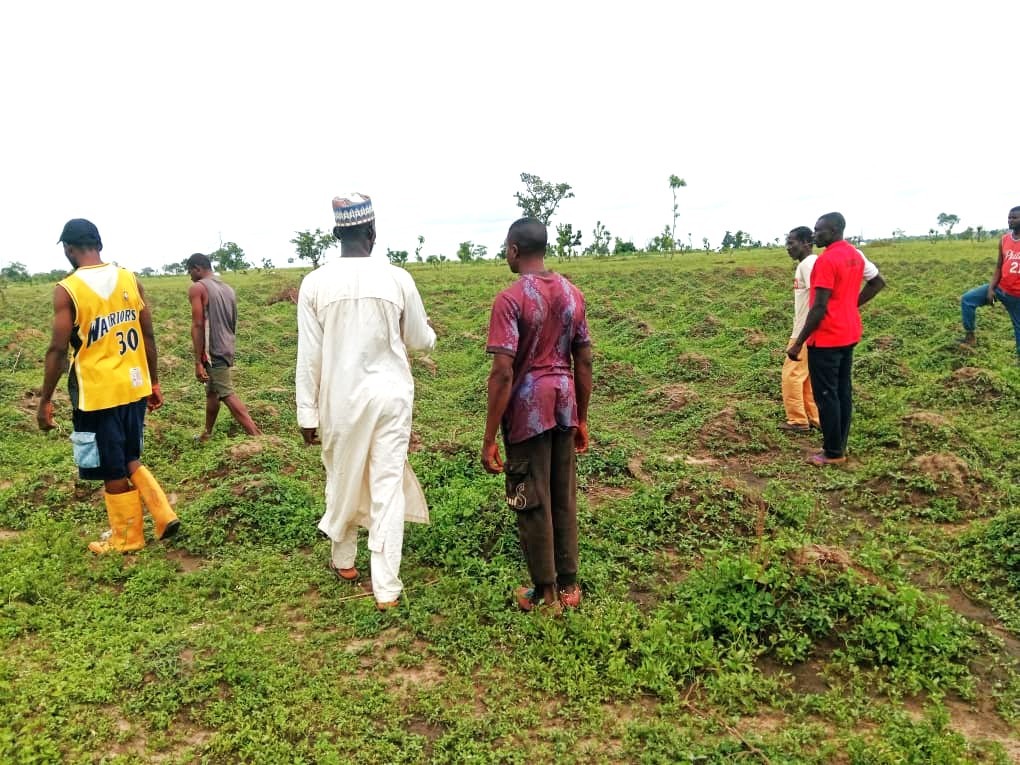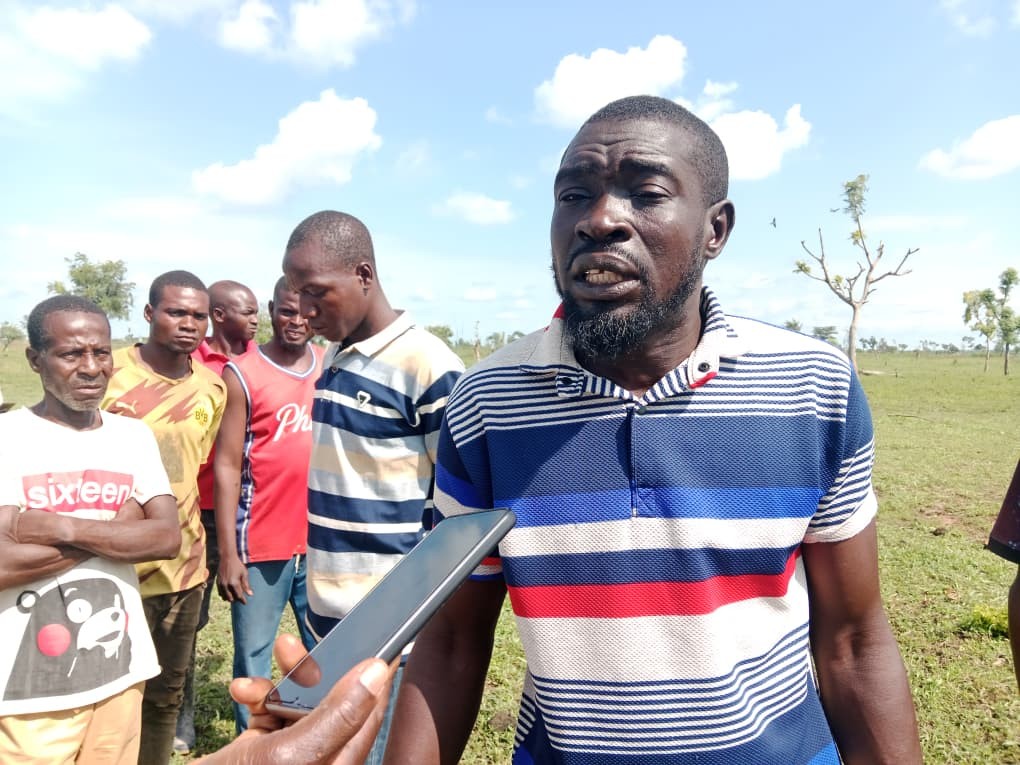SPECIAL REPORT: “We Have Lost Everything” – Farmers In Awe LGA Cry Out As Cattle Devour Farmlands Worth Millions
By Eric M Kuju
In the wide stretch of farmlands that once shimmered with ripened rice and maize in Baure District, Awe Local Government Area of Nasarawa State, silence now hangs heavy. Stalks of trampled crops and hoofprints of cattle are all that remain where hundreds of farmers once looked forward to a fruitful harvest.

For many of these farmers, this year’s farming season has ended in tears, losses, and despair – not because of drought or pests, but because herders allegedly unleashed their cattle to graze freely on cultivated farmlands, leaving behind devastation worth an estimated ₦300 million.
“Our Crops Are Gone; We Have Nothing Left”
Standing on his ruined rice field, Yahaya Ibrahim, who bears the title Garkuwan Matasan Baure, struggled to find words to describe the magnitude of the loss.
“These farms belong to us. Our parents were cultivating this land long before we were born,” he began. “This season I planted rice. I planted over six bags of rice seed. The crops were doing very well. Before I could harvest, the cattle came and cleared everything. There is nothing left for me.”

Yahaya said about 500 farmers have been affected, with many now battling health and financial crises. “Some of our people have developed high blood pressure. Some have even died because of the shock. We borrowed money to cultivate this land. Now everything is gone,” he said, his voice breaking.
He accused the herders of acting with impunity. “Even when journalists came to record the situation, the herders were still grazing their cattle on the farms. It is as if some people have conspired to impoverish us,” he lamented.
For Yahaya, the loss is particularly painful. “I was kidnapped some months ago, and my car was sold to pay the ransom. This farm was my only hope to recover. Now, that hope is gone.”
“They Said The Land Has Been Sold To Them”
Another farmer, Aya Johnson, who has lived in Baure for more than 40 years (according to him), described what is happening as both shocking and heartbreaking.
“At the beginning of the rainy season, around April, some herders came to tell us that the Sangari of Awe had sold the land to them and that we should leave,” he recalled. “We told them this is our farmland. Later, they came and destroyed everything we planted.”
Aya said he had cultivated five bags of rice seed and an additional portion of maize that usually yielded about 25 bags in previous years. “Now they have eaten everything. There is nothing left. Our families will starve. How do we pay school fees or hospital bills?”
According to him, more than 400 farmers have been affected, with the destruction spanning several kilometres of farmland. “We cannot even walk around all the affected farms in one day. That is how wide the damage is,” she said.
He recounted how an attempt by the farmers to stage a peaceful protest was stopped by the police. “They said they didn’t want us to upset the peace in the town. So we decided to go to court because this is a violation of our human rights,” he said. “We are now in court, but our main challenge is survival. This thing has wrecked us completely. There is hunger.”
“All Tribes Have Been Affected”
For Idris Usman, the crisis has united the people in pain. “This thing has affected not just one tribe. The Eggon, Tiv, Ngas, Hausa, Koro, and Mwagavul have all been affected,” he said.
He narrated how the farmers made several efforts to get government attention but to no avail. “Whenever we confront the herders, they always say it is the government that gave them the land. We went to the Ministry of Agriculture and met with the Commissioner, Hon. Tanko Tunga. He said he knew nothing about it. Then we went to the Ministry of Lands, and they also denied knowing anything.”
According to Idris, the farmers later met the District Head of Baure, who directed them to take their complaints to the Emir of Awe. “But on our way there, the police stopped us and appealed that we should not proceed with our protest,” he explained. “At that time, there were still crops standing but nothing was done. Now everything is gone.”
Conflicting Claims Over Grazing Reserve
Investigations reveal that the farmlands in question may fall within the Awe Grazing Reserve, gazetted by the government as far back as the early 1970s.
The District Head of Baure told reporters over the phone that the government had earlier warned farmers not to cultivate portions of the land designated for grazing. According to him, the grazing reserve covers about 23,000 hectares, though only 2,000 to 3,000 hectares are currently in use as part of the Livestock Transformation Programme of the government.
He said local leaders had pleaded with the government to allow farmers to continue cultivating the unused portion until the State was ready to develop the entire grazing reserve. “I was surprised to see that herders are now grazing their cattle there,” he said.
Meanwhile, the Emir of Awe, Alhaji Isa Abubakar Umar II, when contacted decline to speak on record on the matter. also expressed concern over the situation. In a brief comment, he said: “If it is true that the herders are grazing on people’s crops, that is a crime and should be treated as such. But the farmers should also follow proper channels to lodge their complaints.”
A Looming Humanitarian Crisis
Across Baure District, the story is the same; fields flattened, barns empty, and families anxious about how to survive the months ahead.
Farmers say they have lost not just crops, but their means of livelihood. Some took bank or cooperative loans to finance their farms, hoping to repay after harvest. Now, they fear falling deeper into poverty.
Community leaders are calling for urgent intervention from the Nasarawa State Government to prevent the crisis from escalating into violent confrontation.
As Yahaya Ibrahim put it, “We are law-abiding citizens. That is why we have not taken the law into our hands. But we are crying out. Government must come to our aid before hunger and anger push people beyond control.”





